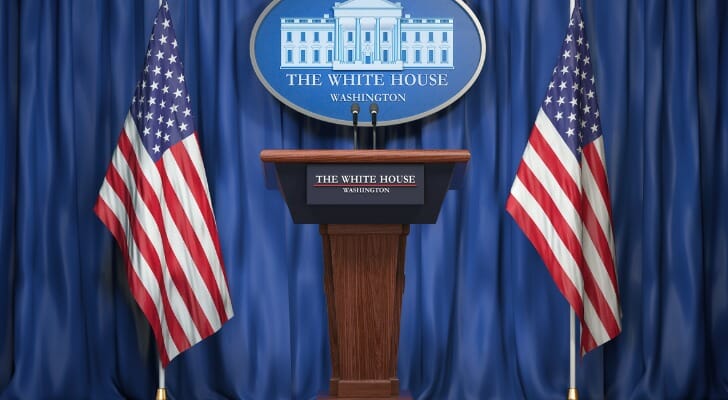Coronavirus Crisis: What the Federal Government Is Doing to Help
As the corona virus pandemic ushers in an era of fear and uncertainty around healthcare needs and economics ones, the White House, Federal Reserve and other government bodies are regularly announcing extensions,...Monday, March 23rd 2020, 3:07 pm
By Caroline Hwang, CEPF®
 As the corona virus pandemic ushers in an era of fear and uncertainty around healthcare needs and economics ones, the White House, Federal Reserve and other government bodies are regularly announcing extensions, suspensions and new programs to help families and businesses weather the financial crisis. Soon, Congress will be adding a new raft of emergency measures. To keep you informed, SmartAsset will continually update this list of official actions that may relate to your finances.
As the corona virus pandemic ushers in an era of fear and uncertainty around healthcare needs and economics ones, the White House, Federal Reserve and other government bodies are regularly announcing extensions, suspensions and new programs to help families and businesses weather the financial crisis. Soon, Congress will be adding a new raft of emergency measures. To keep you informed, SmartAsset will continually update this list of official actions that may relate to your finances.
Coronavirus Crisis Help: Direct Cash Payments
March 23, 2020 – The Senate and House of Representatives are still hammering out this provision of the coronavirus rescue bill as Americans try to navigate the recession that is coming. But the current plan is to send $1,200 in cash to each person ($2,400 to married couples) whose adjusted gross income is less than $75,000 ($150,000 for joint filers). People who earn more, up to $99,000 ($198,000 for married joint filers) would receive reduced amounts. Also, eligible families with children would receive $500 per child.
Coronavirus Crisis Help: Interest Rate CutsMarch 15, 2020 – Seeking to avert or at least shorten the coming recession, the Federal Reserve cut its benchmark interest rate to 0% to 0.25%. The idea is that with borrowing costs next to nothing, banks and financial institutions in turn will offer more loans to businesses and individuals – and keep the economy going. Credit card and mortgage rates typically follow the Fed rate down.
Coronavirus Crisis Help: IRS Tax Return ExtensionsMarch 20, 2020 – Treasury Secretary Steven Mnuchin announced that the 2020 Tax Day has been moved to July 15, 2020. This means that the deadline for filing tax returns and paying income taxes for 2019 is three months later than usual. The extension is automatic, so taxpayers who will be using the extension do not need to file extra paperwork. Additionally, people and businesses who make estimated tax payments have until July 15, too, to submit their first installment for tax year 2020.
Coronavirus Crisis Help: Mortgage ReliefMarch 18, 2020 – If you’ve lost your job or income due to the coronavirus, you may be able to delay your monthly payments without penalty. At the White House’s direction, the Federal Housing Finance Agency (FHFA) has ordered Fannie Mae and Freddie Mac (the Enterprises) to grant forbearance to holders of single-family mortgages for up to 12 months. During this period, you will not incur late fees or be reported as delinquent to credit agencies. The Enterprises are also suspending all foreclosure and evictions for 60 days. To defer your mortgage payments, contact your mortgage servicer. Even if your loan doesn’t fall under FHFA rules, your lender may be offering special forbearance during the national emergency.
Small Business Emergency LoansMarch 13, 2020 – With $50 billion in new funding, the Small Business Administration has been authorized to offer Economic Injury Disaster Loans to small businesses and nonprofit organizations that have been harmed by coronavirus. These loans can be for up to $2 million. Borrowers can use them to cover accounts payable, debts, payroll and other bills. The interest rate on these loans is 3.75%. Be sure to explore your business interruption insurance coverage.
Coronavirus Crisis Help: Student Loan ReliefMarch 20, 2020 – Interest on federally held student loans is being waived for at least 60 days, starting March 13, 2020. This applies to all Direct Loans – plus Federal Perkins Loans and Federal Family Education Loan (FFEL) Program loans held by the U.S. Department of Education. (Note that coronavirus-driven forbearance does not apply to Perkins Loans held by your education institution. It also doesn’t apply to FFEL loans owned by commercial lenders.) Borrowers can also suspend payments for at least two months without penalty. To do so, you must contact your lender or loan servicer. If you are able to make payments, though, the amount you send in will be applied entirely to your principal. (Unless you are in arrears, in which case, it will be applied first to the interest that is owed.)
U.S. Treasury and Bond Market SupportMarch 23, 2020 – The Federal Reserve announced that it will buy U.S. Treasury securities and agency mortgage-backed securities in whatever amounts are needed for the markets to function. This is a change from a previous statement that had specified the amounts as $700 billion of Treasury securities and at least $200 billion of mortgage-backed securities.
Tips for Surviving the Recession- As long as you’re receiving a paycheck, continue contributing to your retirement account. It may be tempting to stop, but investing when the market is low will help balance out the past years of investing when the market was high.
- Don’t go it alone. If you’re especially worried about your portfolio, putting its management into a professional’s hands can be a huge relief. To find a fiduciary financial advisor who’s a good fit for your needs and concerns, use SmartAsset’s pro matching tool. It is free, takes five minutes and will recommend up to three advisors vetted by us.
Photo credit: ©iStock.com/Bet_Noire, ©iStock.com/Bill Chizek
The post Coronavirus Crisis: What the Federal Government Is Doing to Help appeared first on SmartAsset Blog.
Information contained on this page is provided by an independent third-party content provider. Frankly and this Site make no warranties or representations in connection therewith. If you are affiliated with this page and would like it removed please contact pressreleases@franklymedia.com
More Like This
March 23rd, 2020
December 13th, 2024
December 13th, 2024
December 13th, 2024
Top Headlines
December 13th, 2024
December 13th, 2024
December 13th, 2024
December 13th, 2024









